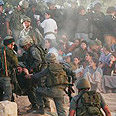
Yaron London
Photo: Yonatan Davis

Troops face off with settlers in Hebron
Photo: AP
“He kicked me in the head,” cried the boy, while two police officers kept him down on the floor. Only a few minutes earlier, the boy and his friends arrogantly spoke about “fighting to the end” against anyone who would dare to evacuate them. Yet here they were now, after the State used a tiny portion of its power, sobbing like children spanked by their father.
The humiliation of the hooligans in Hebron satisfied law enforcement officials, yet the need to deal with this matter for long weeks shows us that the State has yet to internalize an essential lesson: One should not be negotiating with rebels or debating with Messianic zealots. In such cases, patience is not a virtue.
After all, the practice of political Messianism is premised on the patience of authorities: The zealots threaten bloodshed and shift the burden of responsibility to the government. Such maneuvers start with an illegal act, which many citizens see as reasonable utilization of the freedoms reserved for minorities in democratic regimes. When the zealots’ demands are not met, they declare that they shall be fighting to the last drop of blood.
The fear that these threats will materialize prompts all sorts of intermediaries and lobbyists to rush to the corridors of power. Some of them have noble aims, while others seek personal gain. In most cases, a compromise that is akin to capitulation is finalized.
Members of the Gush Emunim settlement movement carried out the first successful experiment 33 years ago at the Sebastia train station. They gathered hundreds of men, women, and children while declaring that they will not leave until they are permitted to settle at the site that today is known as Kedumim.
The concerns that one of them will be hurt, the deeply rooted aversion to violence and a national schism, the weakness of some government ministers and the subversion of others – headed by Shimon Peres – defeated the government in that case.
Threats of rebellion
Many years have passed, and the leaders of Sebastia cooled off and learned to recognize the limits of power. However, they produced students, and the students of these students, who are adopting the ideology and practice of the pioneering generation. There isn’t much difference between them. Today, as was the case back then, the zealots take advantage of the hesitation that precedes the utilization of the State’s power; today as was the case back then, they are exploiting the rivalries within the political establishment.The sweeping success of the Messianic violence prompted two simultaneous processes. First, the settlement movement created an irreversible demographic change that is destined to affect us for generations to come. This movement has utilized, and still does, a sophisticated combination of legitimate politics and acts of violence and deceit. The legitimate aspect softens up the violent features.
This is a sly and incredibly effective game, which combines threats of rebellion, inciting religious edicts issued by rabbis, illegal usage of state funds, disciplined rallies, and criminal acts against Arabs in the occupied territories.
Secondly, the State lost its deterrence power. This affects the results of all the great clashes around us: the ones pitting Jews against Jews as well as the ones between Jews and others. The violent parties win immediately, or win by points. They win in the territories and they win within Israel proper.
Several months ago, in the wake of clashes with squatters at a Hebron house, I proposed that we refrain from deploying huge numbers of soldiers and police officers in incidents of this kind. My proposal was to place one police officer near a sign forbidding entry, and at some distance away posting two armored vehicles with a loaded machinegun. Behind them, according to my proposal, would be the State, which has a monopoly on the use of force.
Of course, this was merely a symbolic image and not a practical guide. Nonetheless, at the time I was accused of incitement to murder. Yet in my view, it was a recommendation for saving Israeli democracy from those who seek to kill it.















